Data is one of the most powerful resources for all industries in the economy. Moreover, the world has already shifted from traditional business operation methods to digital or tech-based methods. It’s no wonder the wave of digitalization has positively impacted all industries. However, the healthcare sector has benefited the most from all industries. The digital transformation has reshaped the entire industry by easing out medical procedures and patient care. Digital transformation in the healthcare sector is defined as the use of technology to boost patient care and ease medical paperwork and procedures. With leveraging digital tools, the healthcare sector is on a continuous verge to enhance and transform the future of medical care. Speaking of digital transformation, as it eases the process and improves patient care, it also brings lots of digital data. Not to be surprised, the healthcare industry is always burdened with large amounts of data. Medical records, patients’ medical history, medical equipment, and more are vital to keeping a record. Besides, the medical history of any patient is crucial information that has to be stored securely.
Did you know: The global digital transformation in the healthcare market is estimated at US$ 65.2B in 2023, with a CAGR of 14.5% from 2023 to 2033.

In a world where digital technology has taken over, the healthcare sector has taken its data into a digital database. However, keeping the data digitized isn’t enough. Managing, sorting, and filtering data is yet another vital task. On top of that, data conversion is also important. There are numerous reasons why businesses hire data conversion service providers. However, healthcare data conversion is a complex process requiring expertise, knowledge, and software to ease the task. Hence, these days, the healthcare industry aims to convert its data by outsourcing data conversion services from top outsourcing companies. To deeply understand healthcare data conversion services, let’s dive in to understand first how the data conversion process is carried out briefly.
How is Data Conversion Done?
The following stages of the data conversion process:
- Scanning is the initial step: It ensures that source records are available. If it is implicit, the process automatically proceeds to the conversion phase (the final stage).
- It entails instructing the API browsers (receiver and transmitter) to interact with one another and permit crawling.
- The collected data is then recognized automatically. Everything happens as a result of satisfying codes or scripts. They provide databases once rendered.
- Following recognition, the datasets are saved on servers with rigorous security.
- This cleansing process includes enrichment, deduplication, formatting, and validation.
- Finally, assuming the output is correct, quality analysts delve deeply into validations (during testing). This is how the standard quality data is created.
- Relevant records are transferred to the desired server location (Cloud).
Losing critical business information or receiving accurate analysis due to low-quality data can negatively affect your company’s efficiency. Converting data may sound easy, but it is a complicated process. Hence ensuring that your data is secured and processed for further use in business.
What is Healthcare Data Conversion?
The data conversion process is essential for the healthcare industry as the sector keeps migrating their data from one software to another for numerous reasons. Based on that, the healthcare sector entirely relies on HIS platforms (Health Information System). Such platforms enhance the quality of care for patients. These platforms include EHRs (Electronic Health Records), eMARs (Electronic Medication Administration Record), EMRs (Electronic Medical Records), pharmacy systems, and other applications associated with healthcare. These platforms carry a wide range of data related to a patient’s medical records and other medical records, including entries of medical equipment, billings and invoices, prescription and medical reports, etc. Migrating large amount of data to such platforms requires a thorough process, which can be granted from data conversion services. On that note, medical data conversion services require the following things: accurate, quality data and a systematic form of database.
Medical Data Conversion Srevices Require the Follwing Things
Accurate Fiels Matching
Collecting Filtered and Unfiltered Data
Collecting all Medical Security
Single Database
Data Collection and Conversion from Medical Surveys
Importance of Data Conversion for Healthcare
The healthcare industry carries a large amount of data, which is crucial for the safety of patients and the medical institute as well. Such type of data needs to be managed precisely. Since data powers every industry, the digital wave has brought significant transformations in healthcare. With a major shift from traditional filing to electronic or digital filing, healthcare firms have started to depend on medical conversion services to manage their database and ensure patient medical records’ safety. For Instance, A doctor checking his patient’s medical history will only enter his name and age in the system for the previous medical records. This eases the process of getting his medical insights instantly from the system if the data is well structured and sorted. On the other hand, when a patient comes to the doctor for the first time, his medical condition will be thoroughly checked and recorded for future use. Therefore, the data will be entered into the system (updating the records). In addition, these records also help in generating medical statistics and surveys. For example, many people suffer from heart disease, out of which many men, women, and children are there. Hence, efficient data conversion for healthcare will help ease data management and overcome challenges faced by traditional data entry. Besides, when it is time to migrate the data from software to different software, the process becomes easier without compromising the quality of data. On that note, the converted data can also be stored on a large cloud server for efficient use by those with access. More or less, data conversion for the healthcare industry pimples to have easily accessed data for healthcare professionals. Medical conversion services are also used to store and convert collected data from e-consultations, telemedicine, and more. Due to the pandemic, the transformation to digital medical services has been smooth and has shown rapid growth. With an exponential rate since the pandemic, EHR data conversion services have deepened. However, the medical industry has some guidelines as the medical data is highly sensitive. The healthcare industry is guarded under the safety of Personal Identifiable Information (PII) and Protected Health Information (PHI). Hence, accurate data conversion for the healthcare industry is highly important to store, manage, and maintain the medical privacy of each patient.
Reliable & Accurate Data Conversion Services
Challenges of Healthcare Data Conversion
As already discussed, healthcare data is large and sensitive too, which makes it complex to convert the lump sum data to maintain the accuracy. However, the process of getting data is easy, yet the healthcare industry may need some help to convert the data, making it difficult for experts to convert the data.
- Duplication of patients’ data or data getting interchanged.
- Patients’ data is in different formats, like text, numbers, images, and so on.
- Patients’ data is also spread across various platforms, such as EMR software, radiology information, pharmacy management, or HIS. It becomes difficult for one to gather and convert data in a single database.
- Every software is different and only records some types of formats, which may lead to misinformation or duplication of data.
- The information may be present in structured or unstructured data.
- Disorganized data, poor fields, mismatched fields, incomplete data or pieces of information can lead to complexity during data conversion service.
To Wrap Up
Precise data conversion for the healthcare industry, while facing few complexities and challenges, is a goal that can be attained with careful preparation and execution. Data conversion service is often a technical and complex procedure that involves conversion tools or computer languages. Besides, managing such a large amount of data in-house can be a cumbersome task for any healthcare institute. Outsourcing medical data conversion services is a suitable option to ensure data quality & accuracy. Therefore, with 14+ years of experience in outsourcing data entry and conversion services, Uniquesdata offers data conversion services for the healthcare industry by a skilled team of professionals and with updated software and tools, ensuring the converted data is helpful for future use.



